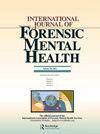Structured Professional Judgment (SPJ) Violence Risk Case Formulation and Psychopathic Personality Disorder
IF 0.9
4区 医学
Q3 CRIMINOLOGY & PENOLOGY
International Journal of Forensic Mental Health
Pub Date : 2021-03-15
DOI:10.1080/14999013.2021.1895378
引用次数: 2
Abstract
Abstract The bivariate, empirical association between psychopathic personality disorder (PPD) and violence has been well established. Yet, questions remain about how to explain why this association occurs. To address this conceptual gap, we presented a review of theories of violence related to PPD. Next a conceptual analysis of how psychopathic traits may influence violent decisions was conducted. Specifically, we systematically analyzed how Comprehensive Assessment of Psychopathic Personality (CAPP; Cooke et al., International Journal of Forensic Mental Health, 11(4), 242–252, 2012) traits influence violence from a structured professional judgment (SPJ) theory of violence known as SPJ decision theory. This conceptual analysis clarifies how various CAPP traits may motivate, disinhibit, or destabilize violence. Implications include the role of causality and clinical applications of violence risk case formulations.结构化职业判断(SPJ)暴力风险案例形成与精神病性人格障碍
精神病态人格障碍(PPD)与暴力之间的双变量、经验关联已经得到了很好的确立。然而,如何解释这种关联发生的原因仍然存在疑问。为了解决这一概念上的差距,我们对与产后抑郁症有关的暴力理论进行了回顾。接下来,对精神病态特征如何影响暴力决定进行了概念性分析。具体而言,我们系统地分析了精神病人格综合评估(CAPP;Cooke et al.,《国际法医心理健康杂志》,11(4),242-252,2012)特征从结构化职业判断(SPJ)暴力理论(称为SPJ决策理论)影响暴力。这一概念分析阐明了各种CAPP特征是如何激发、解除抑制或破坏暴力的。影响包括因果关系的作用和暴力风险案例公式的临床应用。
本文章由计算机程序翻译,如有差异,请以英文原文为准。
求助全文
约1分钟内获得全文
求助全文

 求助内容:
求助内容: 应助结果提醒方式:
应助结果提醒方式:


